2019 AUA Conference Recap
The 2019 AUA meeting was held in Chicago, Illinois. UAB Department of Urology faculty and residents spent the week participating in innovative and educational programs that provided access to groundbreaking research, the latest clinical guidelines and the most advanced technologies in urology.
On Saturday evening, the department hosted an alumni reception at the Marriott Marquis.
Several of our faculty, residents and medical students presented posters, moderated sessions and provided key takeaways. Below are some highlights:
Dr. Dean Assimos presentations, posters, moderated sessions, etc.:
- Surgical & Medical Stone Guidelines Update: A Case-Based Approach
- Complex Cases: Stone Prevention: Diet & Medication
- Complications of Endourology and Stone Treatment
- Panel Discussion on Clinical Cases: How to Approach this Situation
- Closing Remarks: Research on Calculus Kinetics Society (ROCK)
Dr. David Joseph presentations, posters, moderated sessions, etc.:
- ABU Update
Dr. Peter Kolettis presentations, posters, moderated sessions, etc.:
- The Future of Sperm Cyropreservation
Dr. Tanecia Mitchell presentations, posters, moderated sessions, etc.:
- Stone Disease: Basic Research & Pathophysiology I
Dr. Patrick Selph presentations, posters, moderated sessions, etc.:
- Highlights: Society of Genitourinary Reconstructive Surgeons (GURS) Program
Dr. Sunil Sudarshan presentations, posters, moderated sessions, etc.:
- Welcome and Symposium Introduction
- Session One: Basic Science
- Session Four: Prostate
- Closing Remarks
Dr. Kyle Wood presentations, posters, moderated sessions, etc.:
- Influence on Obesity on Urinary Oxalate Excretion
- Leave No Stone Unturned: Approaches to Uncover Rare Kidney Stone Diseases
- Sponsored by Alnylam Pharmaceuticals
Dr. Zachary Glaser (PGY-2) posters, moderated sessions, etc.:
- Poster Session: Validation of MSKCC Pre-Prostatectomy Nomogram in Men who Undergo MRI-Targeted Prostate Biopsy Prior to Radical Prostatectomy
Carter Boyd (UAB MD/MBA student) posters, moderated sessions, etc.:
- Poster Session: Impact of Demographic Factors and Systemic Disease on Urinary Stone Risk Parameters Amongst Stone Formers
- Podium Session: Association of Obesity with Increased Endogenous Oxalate Synthesis
UAB Med Student Has Five Abstracts Accepted at SESAUA 2019
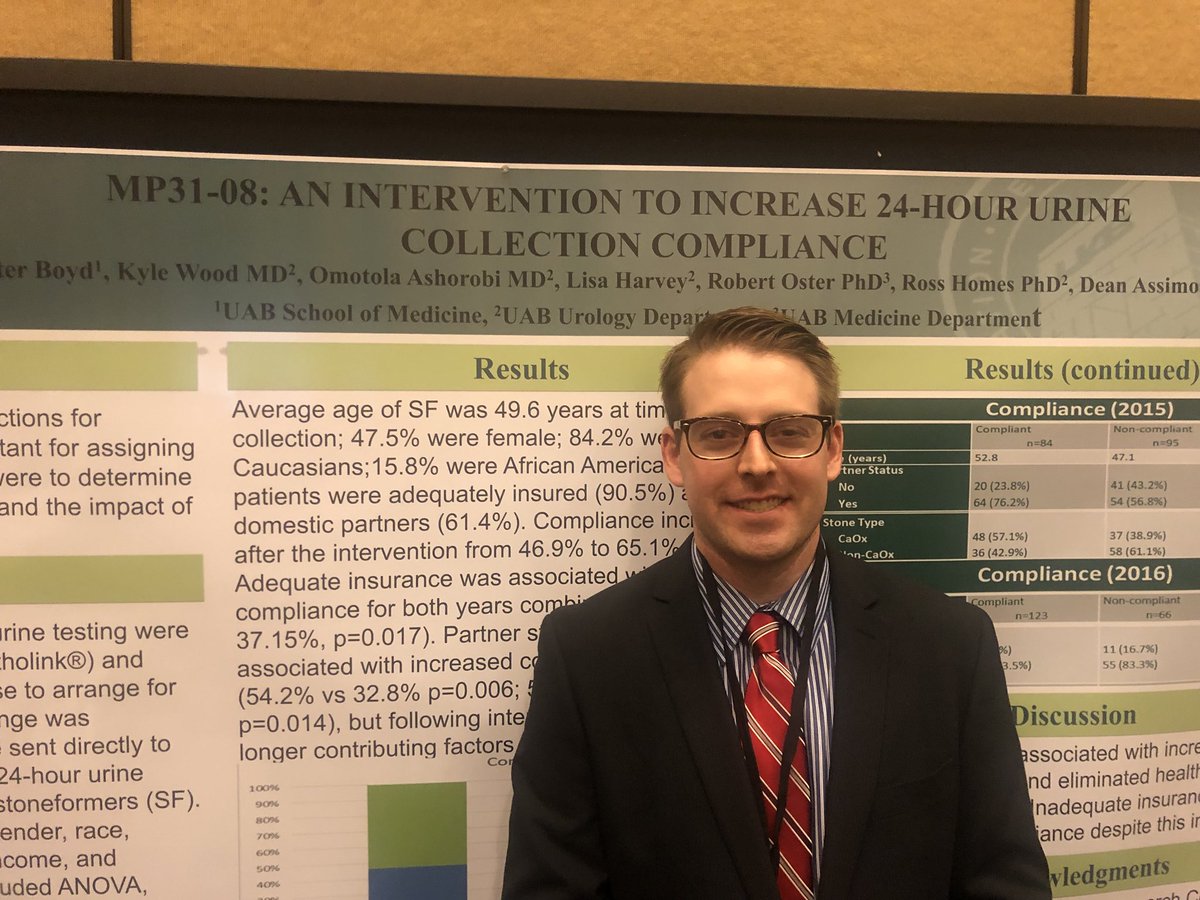 The Southeastern Section of the AUA (SESAUA) is March 13-16, and School of Medicine medical student Carter Boyd had five abstracts accepted. See more details below. Over the summer, Carter was elected as an AUA Medical Student Research Scholar.
The Southeastern Section of the AUA (SESAUA) is March 13-16, and School of Medicine medical student Carter Boyd had five abstracts accepted. See more details below. Over the summer, Carter was elected as an AUA Medical Student Research Scholar.
RNA INTERFERENCE OF HEPATIC LACTATE DEHYDROGENASE AND LIVER METABOLOMIC EFFECTS
Carter Boyd1, John Knight, PhD2, Ross Holmes, PhD2, Dean Assimos, MD2, Kyle Wood, MD2
UAB School of Medicine, Birmingham, Alabama, Department of Urology, University of Alabama, Birmingham, Alabama
Presented By: Carter Boyd, BS
ASSOCIATION OF OBESITY WITH INCREASED ENDOGENOUS OXALATE SYNTHESIS
Carter Boyd1 , John Knight, PhD2 , Ross Holmes, PhD2 , Dean Assimos, MD2 , Kyle Wood, MD2 1 UAB School of Medicine, Birmingham, Alabama, 2 Department of Urology, University of Alabama, Birmingham, Alabama
Presented By: Carter Boyd, BS
ENZYMATIC CHANGES IN ENDOGENOUS OXALATE PATHWAY IN OBESE MOUSE MODEL
Carter Boyd1 , John Knight, PhD2 , Ross Holmes, PhD2 , Dean Assimos, MD2 , Kyle Wood, MD2 1 UAB School of Medicine, Birmingham, Alabama, 2 Department of Urology, University of Alabama, Birmingham, Alabama
Presented By: Carter Boyd, BS
IMPACT OF DEMOGRAPHIC FACTORS AND SYSTEMIC DISEASE ON URINARY STONE RISK PARAMETERS AMONGST STONE FORMERS
Carter Boyd1 , Dustin Whitaker1 , Omotola Ashorobi, MD2 , Robert Oster, PhD3 , John Knight, PhD2 , Ross Holmes, PhD2 , Dean Assimos, MD2 , Kyle Wood, MD2 1 UAB School of Medicine, Birmingham, Alabama, 2 Department of Urology, University of Alabama, Birmingham, Alabama, 3 Department of Medicine, University of Alabama-Birmingham, Birmingham, Alabama
Presented By: Carter Boyd, BS
REVISITING THE VALUE OF A SECOND SEMEN ANALYSIS FOR EVALUATION OF THE INFERTILE MAN
Carter Boyd1 , Daniel Osula, MD2 , Peter Kolettis, MD2 1 UAB School of Medicine, Birmingham, Alabama, 2 Department of Urology, University of Alabama, Birmingham, Alabama
Presented By: Daniel Osula, MD
UAB Urology Research Update
The UAB Department of Urology is actively involved in clinical, basic science and translational research endeavors. Currently, urology research is 11th in NIH funding and our researchers are working hard to improve health outcomes with the most common and difficult to treat diseases. Read more for some recent highlights:
- Recently, Dr. Sunil Sudarshan won a prostate cancer research grant from the Mike Slive Foundation.
- The Southeastern Section of the AUA (SESAUA) is March 13-16, and School of Medicine medical student Carter Boyd had five abstracts accepted. Over the summer, Carter was elected as an AUA Medical Student Research Scholar.
- AUA 2019 is quickly approaching, and many of our faculty, residents and School of Medicine medical students will be representing the department in podium and poster sessions. Find out where you can find us at AUA 2019.
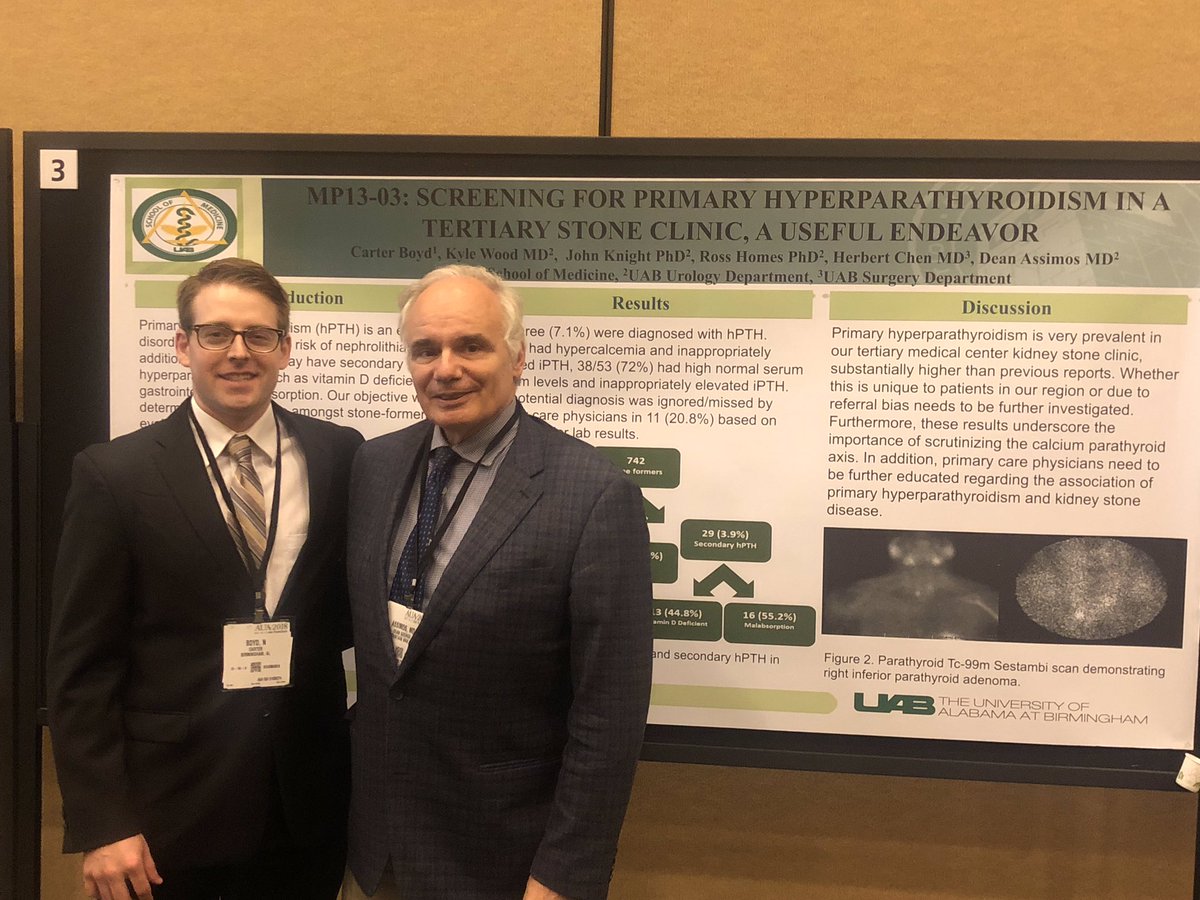
SESAUA 2019: UAB Urology Involvement
The Department of Urology kept busy at SESAUA 2019! Many of our faculty, residents and School of Medicine medical students represented the department in podium, poster and video sessions. A big congratulations goes to all who had articles accepted.
SESAUA also included some invited talks like Dr. Soroush Rais-Bahrami's talk, "State-of-the-Art Lecture: Prostate Cancer Active Surveillance and MRI-Targeted Biopsy".
See below for more conference highlights:
Wednesday, March 13
Podium Session: Socioeconomics and Health Services Research
4:12 pm CRITICAL EXAMINATION OF INDICATIONS FOR URINALYSIS IN THE UNITED STATES
Peter Kolettis, MD, Kyle Gennaro, MD, Gerald McGwin, Jr., MS, PhD
Presented By: Kyle Harrison Gennaro, MD
Poster Session: Nephrolithiasis
3:30-5 pm RNA INTERFERENCE OF HEPATIC LACTATE DEHYDROGENASE AND LIVER METABOLOMIC EFFECTS (Poster #4)
Carter Boyd, John Knight, PhD, Ross Holmes, PhD, Dean Assimos, MD, Kyle Wood, MD Department of Urology, University of Alabama, Birmingham, Alabama
Presented By: Carter Boyd, BS
3:30-5 pm ASSOCIATION OF OBESITY WITH INCREASED ENDOGENOUS OXALATE SYNTHESIS (poster #9)
Carter Boyd, John Knight, PhD, Ross Holmes, PhD, Dean Assimos, MD, Kyle Wood, MD
Department of Urology, University of Alabama, Birmingham, Alabama
Presented By: Carter Boyd, BS
3:30-5 pm ENZYMATIC CHANGES IN ENDOGENOUS OXALATE PATHWAY IN OBESE MOUSE MODEL (poster #11)
Carter Boyd, John Knight, PhD, Ross Holmes, PhD, Dean Assimos, MD, Kyle Wood, MD Department of Urology, University of Alabama, Birmingham, Alabama
Presented By: Carter Boyd, BS
Video Session I
4-5 pm ROBOTIC-ASSISTED LAPAROSCOPIC REPAIR OF BLADDER NECK STENOSIS USING A BUCCAL MUCOSA GRAFT (video #3)
Omotola Ashorobi, MD, Nathan Mendoza, MD, Patrick Selph, MD
University of Alabama at Birmingham Department of Urology
Presented By: Omotola Ashorobi, MD
Thursday, March 14
Poster Session: Prostate Cancer
7-8:30 am VALIDATION OF MSKCC PRE-PROSTATECTOMY NOMOGRAM IN MEN WHO UNDERGO TARGETED BIOPSY USING LESION-BASED AGGREGATE CORE HISTOLOGY REPORTING (poster #46)
Zachary Glaser, MD, Jennifer Gordetsky, MD, Sejong Bae, PhD, Jeffrey Nix, MD, Soroush Rais-Bahrami, MD
University of Alabama at Birmingham, Department of Urology, University of Alabama at Birmingham, Department of Pathology, University of Alabama at Birmingham, Division of Preventative Medicine, University of Alabama at Birmingham, Department of Radiology
Presented By: Zachary A. Glaser, MD
Podium Session: Urethral Disease and Voiding Dysfunction
7:21 am A RETROSPECTIVE ANALYSIS OF COMBINED VENTRAL FASCIOCUTANEOUS SKIN FLAP AND DORSAL BUCCAL MUCOSA GRAFT VS. OVERLAPPING BUCCAL MUCOSA GRAFT FOR URETHRAL STRICTURE DISEASE
Alexander Nocera, MS, Omotola Ashorobi, MD, Patrick Selph, MD
University of Alabama School of Medicine, UAB Department of Urology
Presented By: Alexander Nocera, MS
7:35 am PROPHYLACTIC ANTIBIOTICS AFTER URETHROPLASTY DO NOT REDUCE URETHRAL STRICTURE DISEASE RECURRENCE
Omotola Ashorobi, MD, Joseph Fougerousse, MD, Kimberly Martin, PhD, John Selph, MD University of Alabama at Birmingham, Dept. of Urology, University of Alabama at Birmingham, Dept. of Epidemiology
Presented By: Omotola Ashorobi, MD
Poster Session: Health Services Research
3:50-5 pm IMPACT OF DEMOGRAPHIC FACTORS AND SYSTEMIC DISEASE ON URINARY STONE RISK PARAMETERS AMONGST STONE FORMERS (poster #59)
Carter Boyd, Dustin Whitaker, Omotola Ashorobi, MD, Robert Oster, PhD, John Knight, PhD, Ross Holmes, PhD, Dean Assimos, MD, Kyle Wood, MD
UAB School of Medicine, Birmingham, Alabama, Department of Urology, University of Alabama, Birmingham, Alabama, Department of Medicine, University of Alabama-Birmingham, Birmingham, Alabama
Presented By: Carter Boyd, BS
Friday, March 15
Poster Session: Urologic Oncology
7-8 am HOW WOULD MRI-TARGETED PROSTATE BIOPSY ALTER RADIATION THERAPY APPROACHES IN TREATING PROSTATE CANCER? (poster #95)
Daniel Dix, Andrew McDonald, MD, Jennifer Gordetsky, MD, Jeffrey Nix, MD, John Thomas, MD, Soroush Rais-Bahrami, MD,
Department of Urology, University of Alabama at Birmingham, Birmingham, AL., Department of Radiation Oncology, University of Alabama at Birmingham, Birmingham, AL, Department of Pathology, University of Alabama at Birmingham, Birmingham, AL.
Presented By: Daniel Dix
Poster Session: Outpatient Urology
7-8 am FINANCIAL IMPLICATIONS OF BIPARAMETRIC PROSTATE MAGNETIC RESONANCE IMAGING (poster #105)
Kristin Porter, Alex King, Samuel Galgano, Rachael Sherrer, Jennifer Gordetsky, Soroush Rais-Bahrami
Department of Radiology, University of Alabama at Birmingham, Birmingham, AL., 2Department of Urology, University of Alabama at Birmingham, Birmingham, AL., Department of Pathology, University of Alabama at Birmingham, Birmingham, AL.
Presented By: Rachael Leigh Sherrer, BA
5-6 pm COMPLETION OF THE ERAS PATHWAY IN PATIENTS UNDERGOING SURGERY FOR BENIGN URINARY DIVERSION IS LOW (poster #152)
Omotola Ashorobi, MD, Alexander Nocera, MS, John Selph, MD
University of Alabama at Birmingham, Dept. of Urology, University of Alabama School of Medicine
Presented By: Omotola Ashorobi, MD
Saturday, March 16
Poster Session: Andrology II
7-8 am REVISITING THE VALUE OF A SECOND SEMEN ANALYSIS FOR EVALUATION OF THE INFERTILE MAN (Poster #174)
Carter Boyd, Daniel Osula, MD, Peter Kolettis, MD
UAB School of Medicine, Birmingham, Alabama, Department of Urology, University of Alabama, Birmingham, Alabama
Presented By: Daniel Osula, MD
Podium Session: Prostate – Benign and Malignant
7:14 am COMPARISON OF BI-PARAMETRIC MRI TO FULL MULTIPARAMETRIC MRI FOR DETECTION OF CLINICALLY-SIGNIFICANT PROSTATE CANCER
Rachael Sherrer, Zachary Glaser, MD, Jennifer Gordetsky, MD, Jeffrey Nix, MD, Kristin Porter, MD, Soroush Rais-Bahrami, MD
Department of Urology, University of Alabama at Birmingham, Birmingham, AL., Department of Pathology, University of Alabama at Birmingham, Birmingham, AL., Department of Radiology, University of Alabama at Birmingham, Birmingham, AL. Presented
By: Rachael Leigh Sherrer, BA
T. Leon Howard Imaging Session
12-1 pm 54 YEAR OLD MALE WITH GROSS HEMATURIA IN HEMORRHAGIC SHOCK (case #4)
Ava Saidian, MD, James Ellenburg, MD, Soroush Rais-Bahrami, MD University of Alabama-Birmingham Medical Center
Presented By: Ava Saidian, MD
Single Port Robot, First of its Kind in Alabama
The University of Alabama at Birmingham is one of first 15 centers of excellence in the United States, and the first in Alabama, to implement a new single port robot manufactured by Intuitive Surgical.
Three of Department of Urology providers, Dr. Jeffrey Nix, Dr. Soroush Rais-Bahrami and Dr. Patrick Selph, have been trained to use the new equipment located at UAB Highlands Hospital. The single port robot will be used for many different procedures, but a primary focus will be on cancer. This instrument will be used to push the envelope in minimally invasive surgery in order to provide patients the highest level of cutting edge care.
The first two cases performed at UAB were both prostatectomies performed on Friday, Jan. 25th by Dr. Nix. The Department of Urology is proud to be involved in the use of cutting edge technology at UAB.
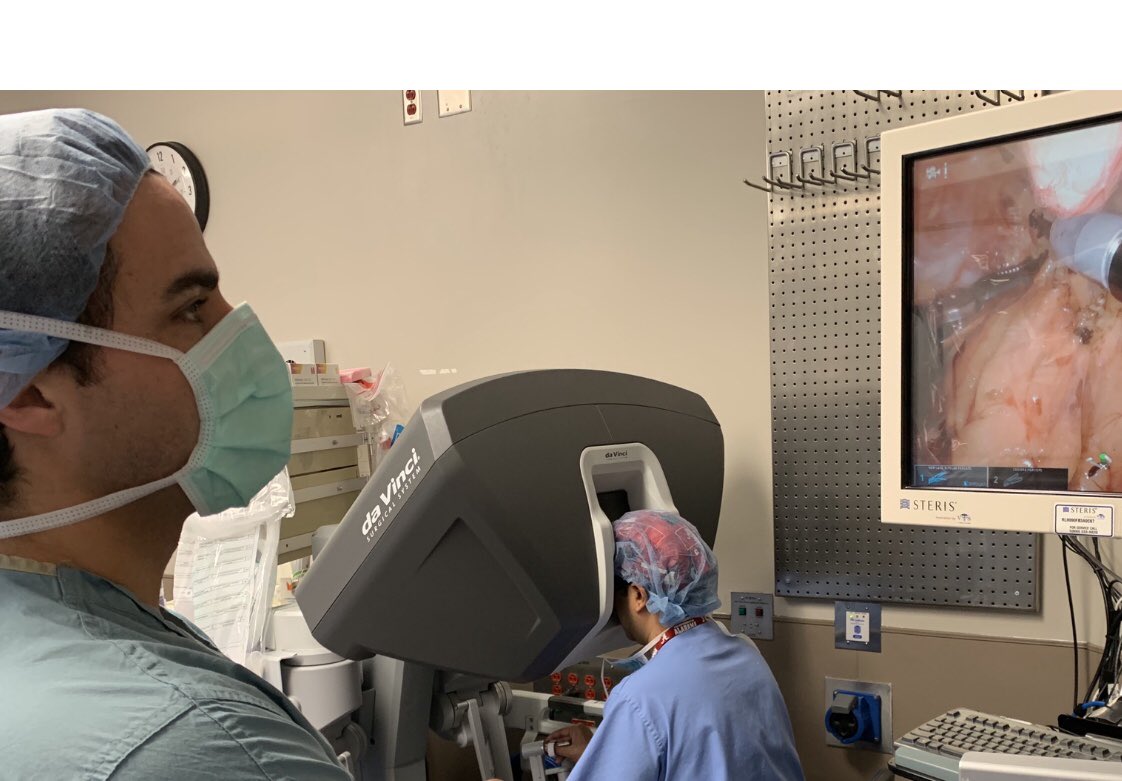
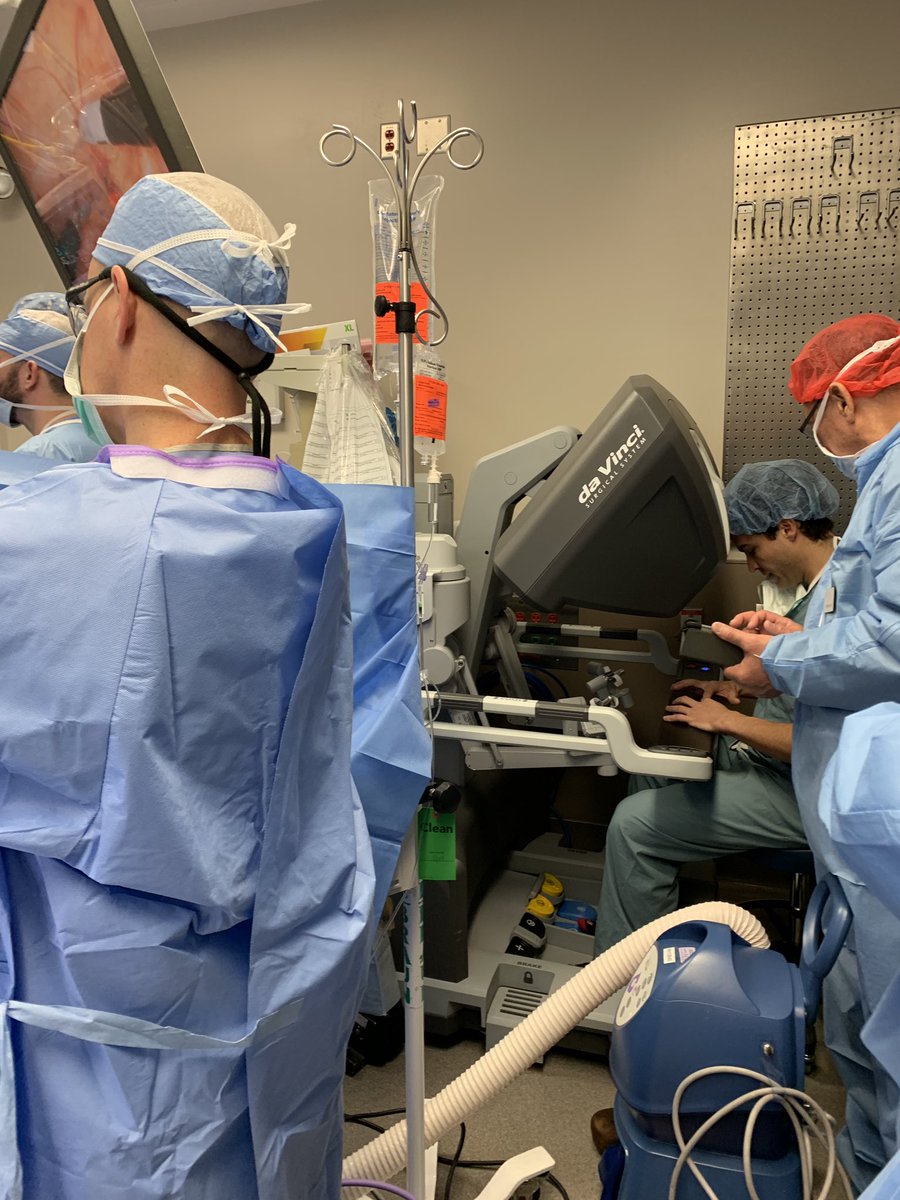
Welcome New UAB Urology Team Members!
The Department of Urology is growing! We'd like to welcome Amanda Harris, Dr. Lance Patterson and Brandy Nix to our team. Find out more about each of them below:
Amanda Harris, BSN, RN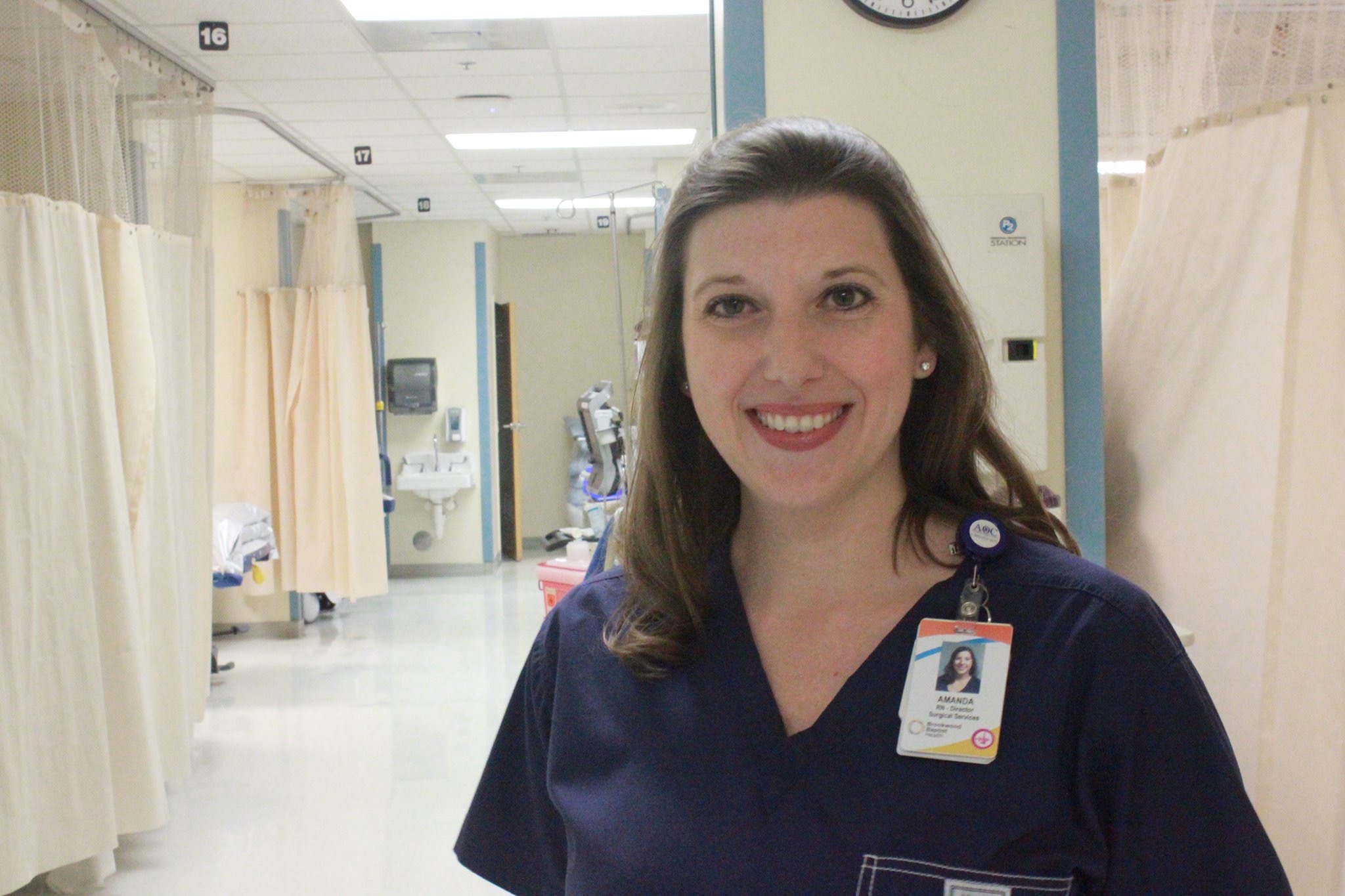
Amanda Harris is the Manager of Ambulatory Services for the Department of Urology.
Amanda graduated from the University of Alabama with a BSN and has been a nurse for 16 years. She has worked in the Birmingham area as a staff RN, Clinical Care Coordinator and Director of Surgical Services. Amanda has experience in several areas, including SICU, PACU, pre op, pre admit testing, same day surgery and surgery scheduling. Amanda enjoys learning and being a resource for others and is excited to be joining UAB's health care system at The Kirklin Clinic.
Amanda is married and has a six-year-old son. During her free time, she enjoys time with her family playing sports, watching sports and reading.
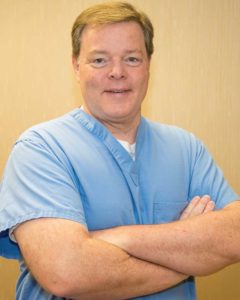 Lance Patterson, MD
Lance Patterson, MD
Dr. Patterson earned his medical degree from the University of South Alabama in Mobile where he also received his Bachelor of Science degree in Chemistry. He completed his general surgery and urology residencies at the Bowman Gray School of Medicine in Winston-Salem, North Carolina where he was Chief Resident in Urology. He is a member of the American Urologic Association, the American Society of Clinical Urologists and the Association of American Physicians and Surgeons.
Dr. Patterson hold clinic at the Russell Medical Center in Alexander City.
Brandy Nix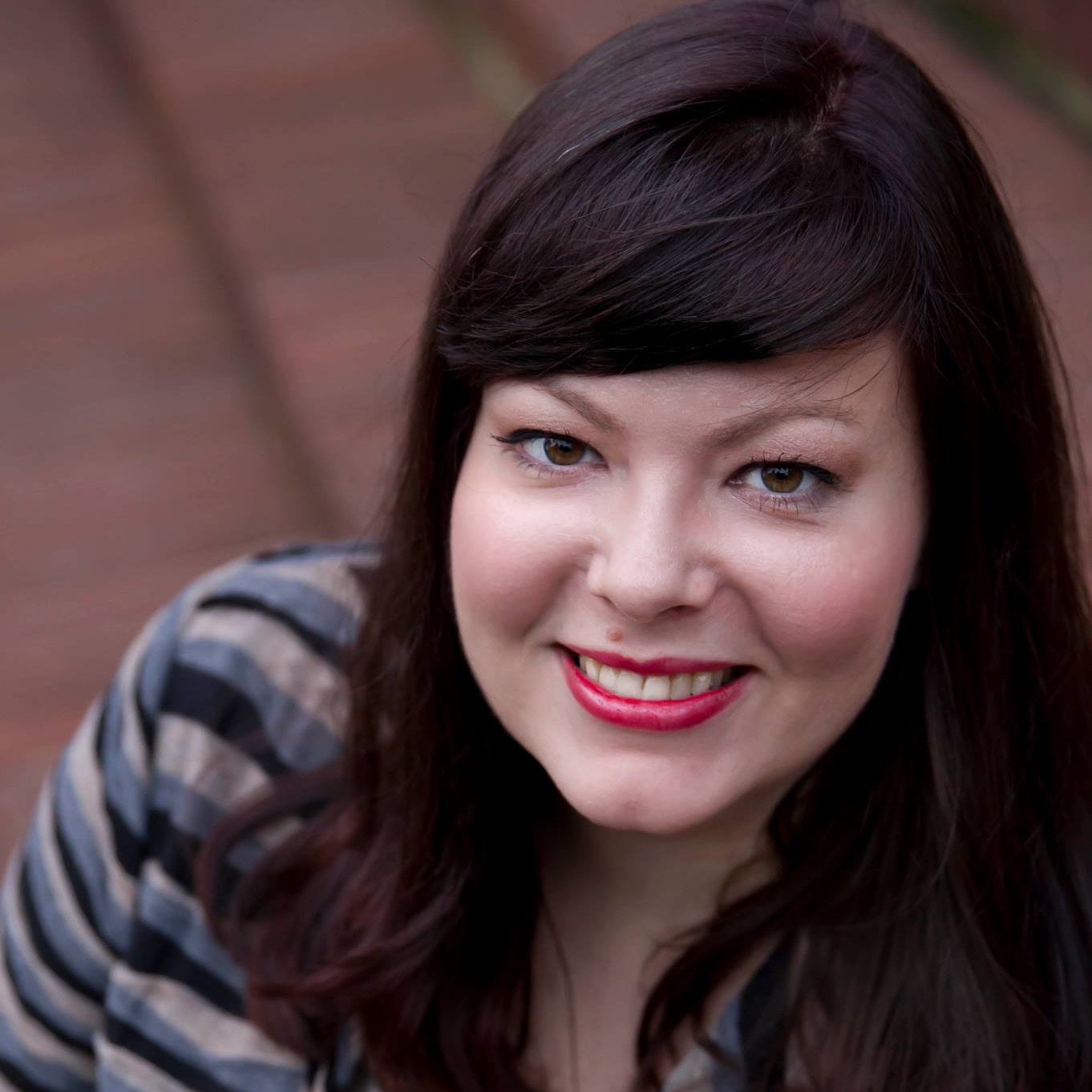
Brandy is the Financial Officer for the Urology, Neuro Surgery and Otolaryngology Research Group.
Brandy attended the University of Alabama where she double-majored in Finance and German. She continued her education there getting an MBA and a Masters in German. Upon graduation she moved to Birmingham and worked for five years at BBVA Compass, first in Customer Intelligence and then in Credit Risk. In 2012 she moved to Regions where she worked in the Consumer Lending Finance until she made the move to UAB.
Alumni Spotlight: Dr. Douglass Clayton
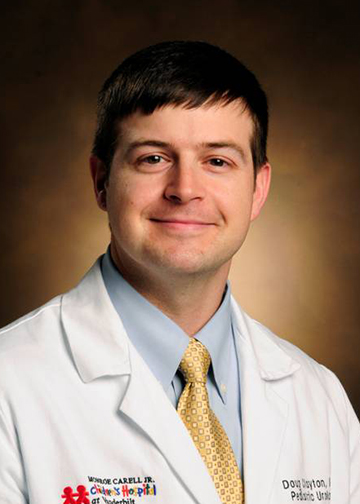 When did you graduate from UAB?
When did you graduate from UAB?
I finished my residency in 2009.- What city are you located in?
I live in Nashville, TN and practice at the Monroe Carell Jr. Children’s Hospital at Vanderbilt. - What are your clinical/research interests?
I am a pediatric urologist, and I spend about 60% of my time working on NIH-funded research studying bladder inflammation. We use mouse models to study compounds that can reverse or prevent bladder injury and inflammation. The other 40% of my time is dedicated to caring for children with pediatric urology problems. - How did you choose to practice this area of urology?
During my time at UAB, I decided to pursue an academic career path and the great experience I had at Children’s led me to do a fellowship in Pediatric Urology at Vanderbilt University Medical Center. Because of this fellowship, I became interested in basic science research and how it applies to children with bladder problems. - What aspect of your time at UAB do you believe was most valuable as you started your career?
As a pediatric urologist, I would say my time at Children’s was the most valuable. Because only one resident was on service at that time, we had unlimited access to a lot of pediatric urology. - Did you have a particular mentor while at UAB? Why were they a good mentor?
Honestly I had really strong mentorship from all the faculty at UAB while I was there, and I have great memories from my training. Clearly, I had strong mentorship from Drs. Joseph and Kitchens as well as Dr. Tony Herndon during his time at UAB. All three of these mentors were instrumental in my career choice and I use lessons I learned from them on regular basis in my practice. - What is one of your fondest memories from UAB?
Some of my fondest memories during my time at UAB were the Fridays we would spend in the OR with Dr. John Burns doing full day of stone cases. He was always such an approachable mentor with a wealth of knowledge. He provided me and many others with great training in taking care of patients with kidney stones. - Give one piece of advice you’d like to share with the current residents or those recently graduated.
The biggest piece of advice I can give to current residents is to not forget how fortunate you are to be in training. Even though it is a very busy time in life, residency is when you have the opportunity to learn from others successes, trials, and tribulations before you get to experience your own as a practicing urologist. I also encourage the residents to take great notes from the operations they observe and participate in. Even today, I still refer to notes I took from residency today. - When you’re not working, how do you spend your time?
When I am not working, I enjoy spending time with my wife and two sons, Jack (age 9) and William (age 7).
Alumni Spotlight: Dr. Thanmaya Reddy
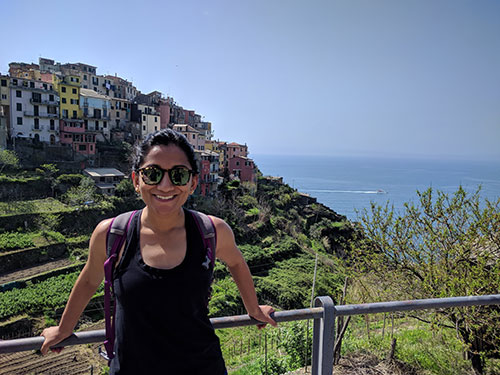 When did you graduate from UAB?
When did you graduate from UAB?
I graduated from UAB in 2017.- What city are you located in?
Atlanta, GA - What are your clinical/research interests?
General Urology, Stone Disease and Residency Education - How did you choose to practice this area of urology?
The field of urology has a rare balance of medicine and surgery, by going into general urology I get to enjoy the full breadth of the specialty. As a faculty member at Emory, I have the unique opportunity of practicing general urology but also getting a chance to educate residents. - What aspect of your time at UAB do you believe was most valuable as you started your career?
As I progressed through residency training, I was given increasing responsibility and independence in respect to clinical and surgical decision-making. This concept of graduated responsibility has allowed me to develop my autonomy with confidence as a new attending. - Did you have a particular mentor while at UAB? Why were they a good mentor?
It’s difficult to pinpoint a specific mentor while I was at UAB. I learned so many things from so many people through my 5 years as a resident. Dr. Assimos is single-handedly responsible for my appreciation for clinical and basic science research. In addition, his big heart, generosity and caring nature serve as a framework for how I approach my own patients every day. Though we often think of our attendings as our mentors, I also want to acknowledge Courtney Shepard (now Streur). Two years my senior, I was fortunate to have her as my chief on multiple rotations. In fact, we spent 8 out of 12 months together my first year of Urology. Her optimism, work ethic and respectful nature made her an excellent role model. - What is one of your fondest memories from UAB?
Just one? Some of my favorites are operating alongside my co-chiefs during my final year, Snowpocalypse 2014 when the entire department got snowed in for nearly two days, annual crawfish boils hosted by the chiefs, a tradition I’ve carried with me to Atlanta. - Give one piece of advice you’d like to share with the current residents or those recently graduated.
Write. Down. Everything. How to workup patients in clinic, surgical steps, interesting consults, rare complications, when Dr. So-and-so wants catheters removed - Everything. Also, don’t be afraid to take some time off after graduation. I took off just over 3 months and don’t regret a single day of it. - When you’re not working, how do you spend your time?
Cooking, exercising, reading, hiking, traveling, exploring Atlanta with my husband.
UAB Urology Awarded P20 Grant
UAB Department of Urology Drs. Dean Assimos, Ross Holmes, John Knight and Kyle Wood, along with UAB Department of Nutrition Sciences Dr. Barbara Gower have been awarded a P20 exploratory grant to establish an interdisciplinary research center in benign urology. Funded through the NIDDK, the grant provides $200,000/year for two years toward research on the impact of obesity in endogenous oxalate synthesis.
Over the last few years, UAB Urology has worked closely with UAB's Nutrition Obesity Research Center (NORC) and Dr. Gower. The complementary expertise has led to novel findings in obesity and kidney stone disease. A new center, COOKS (Center for Research on Obesity and Oxalate Kidney Stones), has been created through the P20.
The prevalence of both kidney stones and obesity are increasing in the United States. The Southeast is considered the kidney stone belt, a region of the country where there is the highest prevalence of kidney stone formers. While the associations between obesity and kidney stone risk have been defined, the mechanisms behind this relationship is unknown.
Preliminary data supports a direct relationship between obesity and the amount of urinary oxalate excreted derived from endogenous oxalate production. Oxalate is a part of the most common type of kidney stone.
The goal of the P20 is to increase the understanding of the relationships between obesity and endogenous oxalate synthesis and hopefully serve as a platform to develop novel therapies for stone prevention.
Welcome Dr. J.E. "Jed" Ferguson
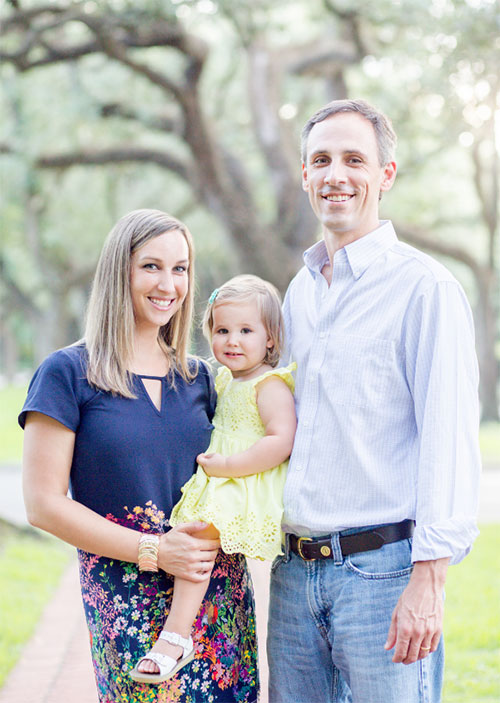 Tell us a little about yourself.
Tell us a little about yourself.
I was born in San Francisco CA, but moved with my family to Charlottesville, VA in 4th grade, and have been in the southeast ever since. I went to UVa undergrad, and UNC-Chapel Hill for MD/PhD. I met my wife Liz at the MD/PhD program retreat in Wrightsville Beach, NC. I took a quick career detour into Internal Medicine at Massachusetts General Hospital in 2009, but got back on track with UNC Urology, where I met my current colleagues Jeff Nix and Patrick Selph. After residency, Liz and I went down to Houston, TX in 2016 to pursue fellowships in Urologic Oncology at MD Anderson and Child and Adolescent Psychiatry at Baylor School of Medicine. There I studied the molecular drivers of bladder cancer with my mentors Colin Dinney, MD and David McConkey, PhD. We and our 3 year old daughter Lane are so excited to be in Birmingham and to work with Dr. Assimos and the outstanding faculty at UAB Urology.- What made you want to become a physician?
My father was (and still is) an OB-GYN with a focus on Maternal-Fetal Medicine. His enthusiasm for medicine and science had a huge impact on me. He and my Biochemistry professor at UVA (Charles Grisham) sparked an interest in explaining life and disease at the molecular level, which still drives me today. Matt Coward (then a Urology intern, and now a Urologist at UNC) was singularly responsible in showing me how amazing Urology is and how grateful our patients are. He embodied the “thoughtful-surgeon” which I think is very prevalent in Urology in general and UAB Urology in particular. - What is the best part of your job?
Being entrusted by patients to help them navigate the peaks and valleys of a cancer diagnosis and treatment. - What does the future of medicine look like in your area of interest?
It’s an exciting time in bladder cancer. We’re starting to understand that there are biologically unique molecular sub-types of bladder cancer and that these subtypes behave differently and respond differently to treatments. New bladder-instillation therapies are being developed for early bladder cancer, and for advanced non-metastatic bladder cancer I think we’re a few years away from considering bladder preservation in select patients. Immunotherapy has revolutionized the treatment options in the metastatic setting, and if we can harness or amplify this effect in early bladder cancer, we could really improve the quality of life for our patients. - How do you like spending your time off? Any other interesting facts you’d like to share?
We’ve really been enjoying exploring in and around Birmingham since we got here in July. We’ve been to great restaurants (yes, we’ve already been to Highlands – twice!), to hikes at Red Mountain, Oak Mountain and Ruffner Mountain, boating on Logan Martin Lake, Sloss Furnaces, 16th Street Church, Pepper Place, the Birmingham Zoo, Botanical Gardens – the list goes on.
We’ve got a son on the way (Liz is due Valentine’s day 2019), so we’re busy getting the nursery ready. Lane was convinced she was having a sister before our anatomy ultrasound, and when the ultrasonographer told her she was having a little brother she cried out “But I want a sister!” She’s coming around now, but when brainstorming for names, “Sally” and “Margaret” are two of her favorites…
Farewell to the 2018 Chiefs!
The Department of Urology enjoyed a wonderful evening at the Birmingham Country Club celebrating the graduation of our three PGY-5 residents and two fellows.
- Dr. Patrick James Guthrie is headed to north Alabama to work at Decatur Morgan Hospital.
- Dr. Win Shun Lai is moving to Austin, Texas to practice at Baylor, Scott and White Medical Center.
- Dr. Erik Lars Wallin III is also headed to north Alabama and will be working at Cullman Regional Medical Center.
- Dr. Jubilee Tan is headed back to practice in Peoria, Illinois.
- Dr. Kyle Wood also completed his fellowship at UAB and will remain with the Department of Urology focusing his research and clinical endeavors on kidney stone disease.
Dr. Sunil Sudarshan won the Urology Faculty Teaching award for 2017-2018, and Dr. Vidu Yarlagadda (rising PGY-5) recieved the Resident Research Award. Congrats!
All of our graduated PGY-5 residents will be greatly missed. We wish them the best of luck on their future endeavors.
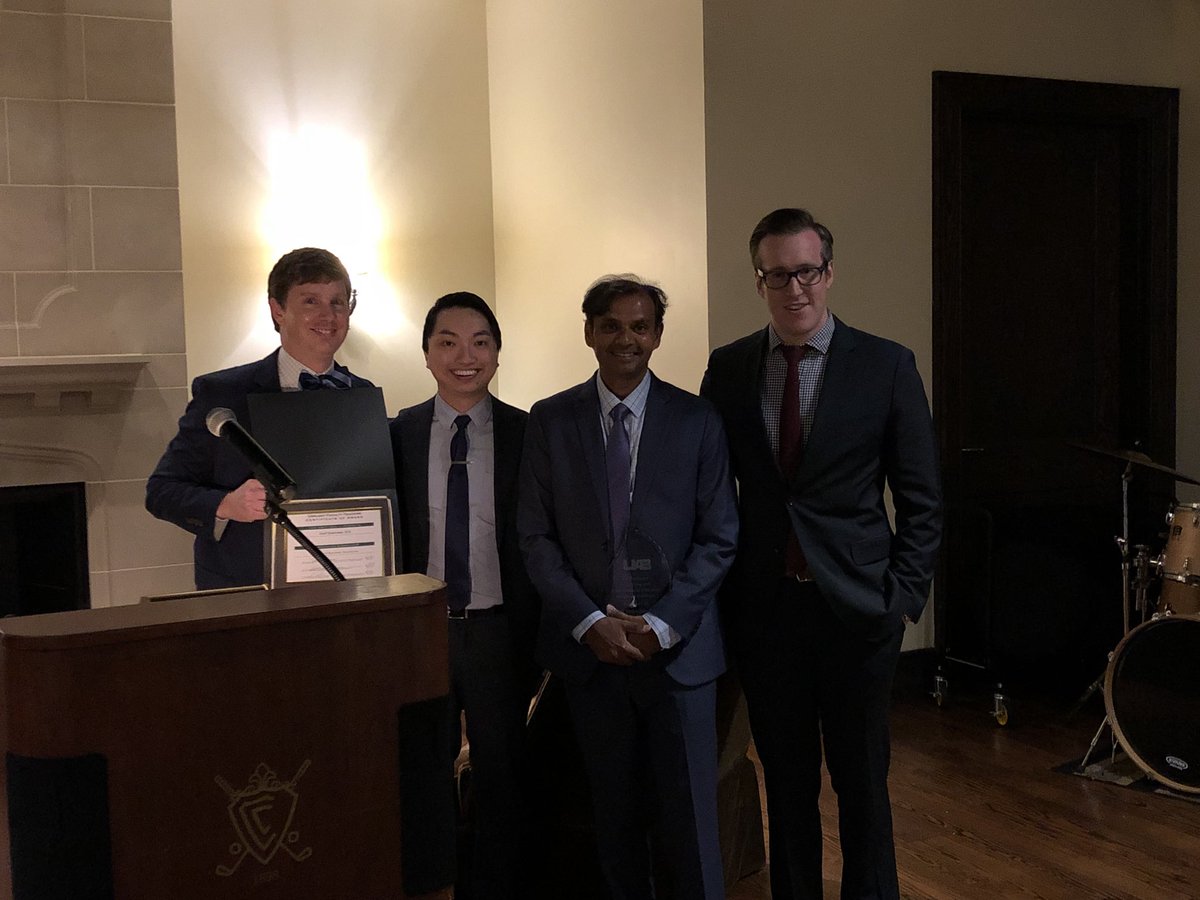
AUA Conference Recap
The 2018 American Urological Association conference was an eventful one for the UAB Department of Urology. Our faculty spent four days in San Francisco participating in innovative and educational programs that provided access to groundbreaking research, the latest clinical guidelines and the most advanced technologies in urology.
On Saturday evening, the department hosted an alumni reception at the Marriott Marquis where faculty and alumni enjoyed network over drinks and hors d'oeuvres.
Several of our faculty, residents and medical students presented posters, moderated sessions and provided key takeaways. Below are some highlights:
Dr. Dean Assimos presentations, posters, moderated sessions, etc.:
- Stone Disease: Basic Research & Pathophysiology II (co-moderated with Dr. Tanecia Mitchell)
- Surgical & Medical Stone Guidelines Update: A Case-Based Approach
- Session 5: The Future is Bright (ROCK Society)
- Gotta Wear Shades (ROCK Society)
Dr. Peter Kolettis presentations, posters, moderated sessions, etc.:
- Infertility: Therapy I
Dr. Tanecia Mitchell presentations, posters, moderated sessions, etc.:
- Stone Disease: Basic Research & Pathophysiology II (co-moderated with Dr. Dean Assimos)
- Take Home Messages: Basic Science (Benign)
Dr. Soroush Rais-Bahrami presentations, posters, moderated sessions, etc.:
- US Fusion Guided Prostate Biopsy: Integrating MP MRI and Biopsy into Your Urologic Practice for Screening, Diagnosis and Treatment Planning
Dr. Patrick Selph presentations, posters, moderated sessions, etc.:
- Conservative and Endoscopic Management of Urethral Trauma
Dr. Tracey Wilson presentations, posters, moderated sessions, etc.:
- Take Home Messages: Female Urology/Incontinence
Dr. Kyle Wood presentations, posters, moderated sessions, etc.:
- RNA interference of Hepatic Lactate Dehydrogenase Reduces Urinary Oxalate in a Mouse Model of Primary Hyperoxaluria Type 1
- Association of Obesity with Increased Endogenous Oxalate Synthesis
- Urinary Oxalate Excretion in Obese Mouse Model
Dr. Luke Ellenburg (PGY-3) posters, moderated sessions, etc.:
- The Use of Formalin as a Fixative for Testicular Biopsies
Carter Boyd (3rd year UAB MD/MBA student) posters, moderated sessions, etc.:
- Screening for Primary Hyperparathyroidism in a Tertiary Stone Clinic, a Useful Endeavor
- An Intervention to Increase 24-hour Urine Collection Compliance
- **Carter Boyd was also awarded the Urology Care Foundation Summer Medical Student Fellowship for “Endogenous Oxalate Synthesis in a Diet-Induced Obese Mouse Model”**

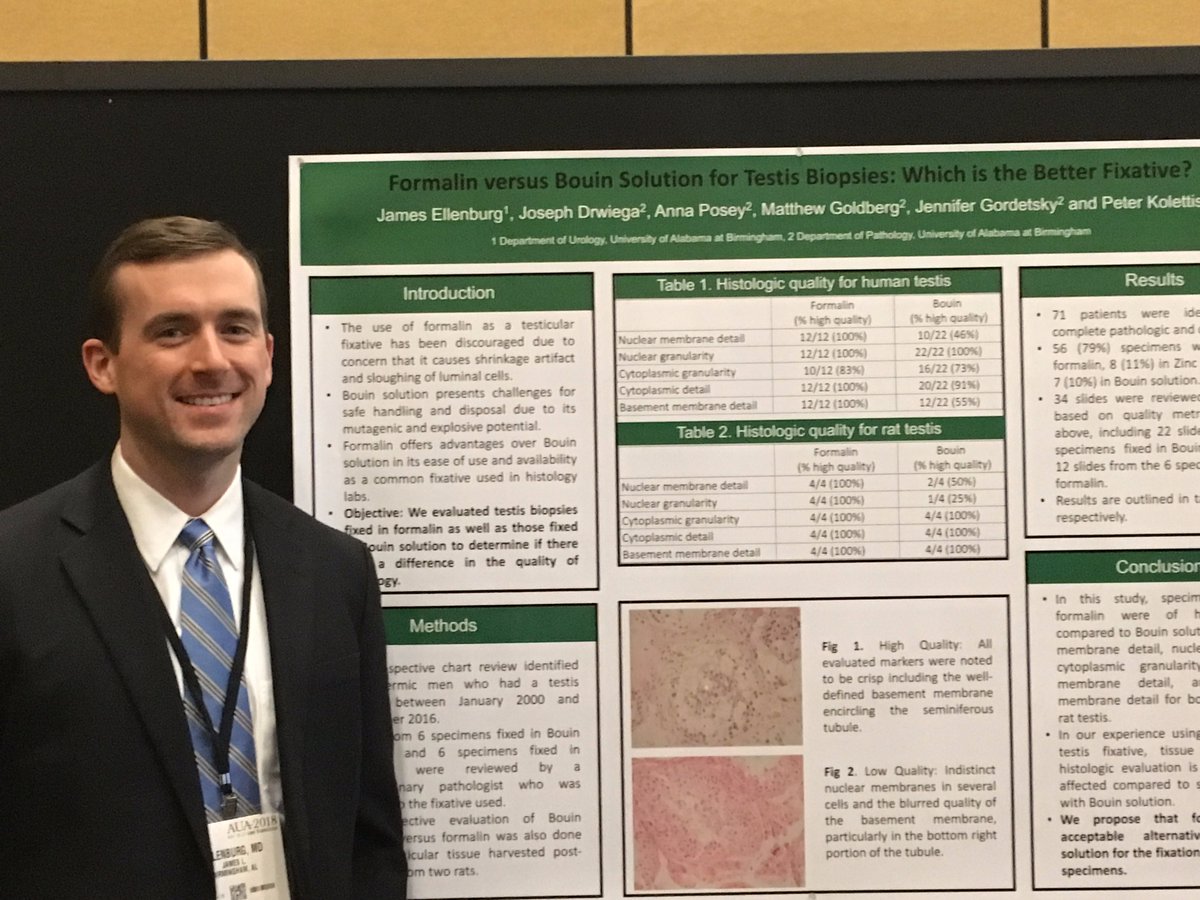
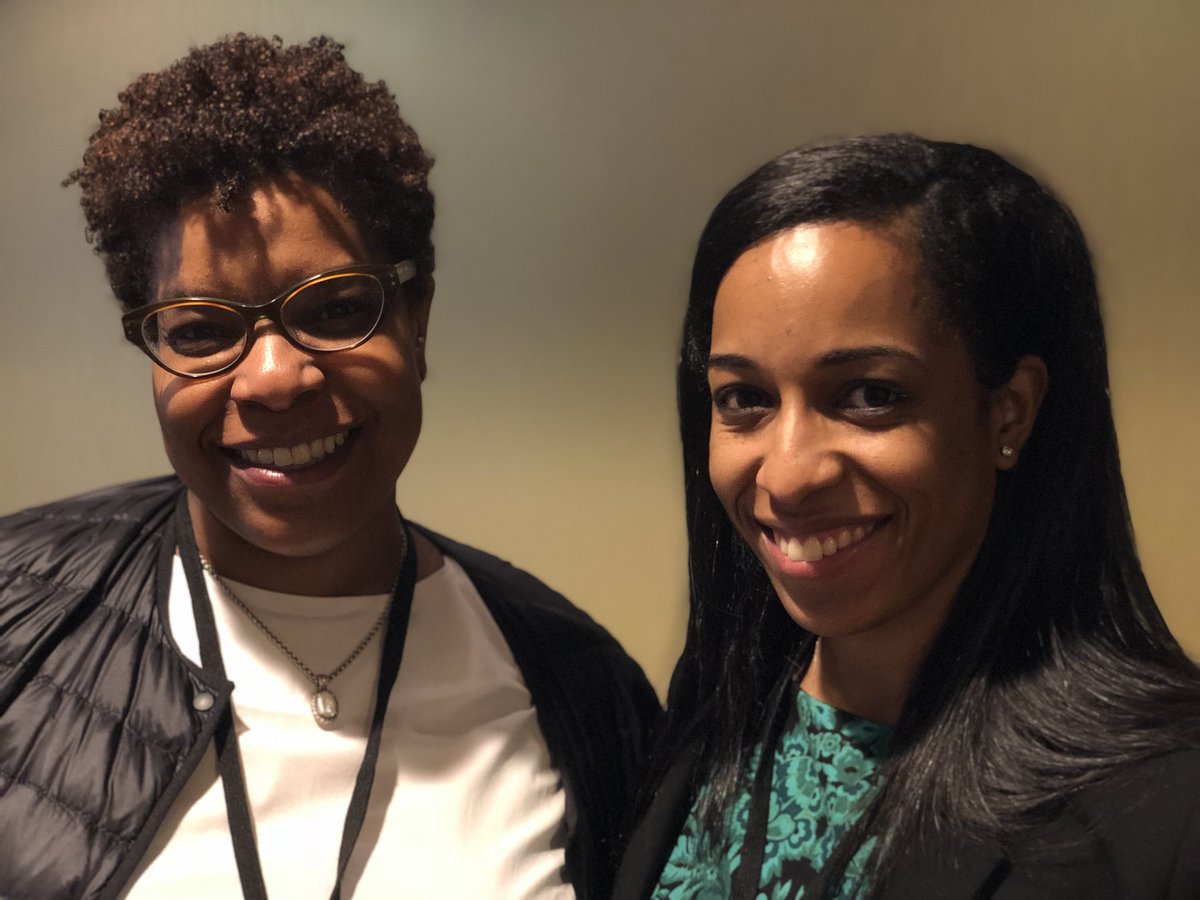


Recap: 2018 Gulf Coast Urology Seminar
The UAB Department of Urology sponsored the 2018 Gulf Coast Urology Seminar in beautiful Destin, Fla., July 13-15. The thought-provoking program made for a weekend of quality urologic education, networking with colleagues and enjoying one of the most beautiful beaches in the country.
Attendees had the opportunity to take part in many programs and sessions.
To kick off the weekend, the Men’s Health and Prosthetic Surgery session was moderated by Dr. Patrick Selph. UAB Urology faculty topics in this session included:
- "Modern Management of Peyronie’s Disease" by Dr. Patrick Selph
- "Supplements and Male Infertility" by Dr. Peter Kolettis
After a quick Q&A and case presentations, Dr. Sunil Sudarshan moderated the first oncology session which included presentations by several UAB Urology faculty.
- "Bladder Preservation for High Grade Bladder Cancer" by Dr. Jeffrey Nix
- "Prostate Cancer Screening: Update by the US Preventive Services Task Force" by Dr. Sunil Sudarshan
- "Fluciclovine F18 and PSMA PET Imaging for Prostate Cancer" by Dr. Soroush Rais-Bahrami
The first day concluded with a networking reception that included attendees, spouses and guests.
Saturday began with a session on Endourology/Nephrolithiasis moderated by Dr. John Burns. UAB Urology faculty presentations included:
- Dr. Kyle Wood on "Missed Diagnoses in the Management of Kidney Stone Disease and Management of the Encrusted Ureteral Stent"
- Dr. Dean Assimos on "Complications of PCNL"
The next session was moderated by Dr. Patrick Selph and focused on Health Policy. Dr. Patrick Selph also presented “Experience with Urology in Europe: The EAU-AUA Scholar Exchange Program” during this session.
On Saturday evening, attendees gathered for a nice dinner at the Marlin Grill in Baytowne Warf.
A second oncology session moderated by Dr. Patrick Selph kicked off the final day of the conference. Sessions by UAB Urology faculty included:
- "Surgery for Oligometastatic Prostate Cancer" by Dr. Jeffrey Nix
- "Expanding Indications for Prostate Cancer Surveillance" by Dr. Soroush Rais-Bahrami
The day ended with a session on Andrology and Pediatric Urology moderated by Dr. Patrick Selph with presentations by:
- Dr. Peter Kolettis giving an "Update on Vasectomy"
- Dr. Pankaj Dangle on "The Use of Robotic-Assisted Surgery in Pediatric Urology"
Alumni Spotlight: Dr. Win Shun Lai
Where are you headed now that you've graduated?
General urology position with Baylor, Scott and White in Austin, Texas. 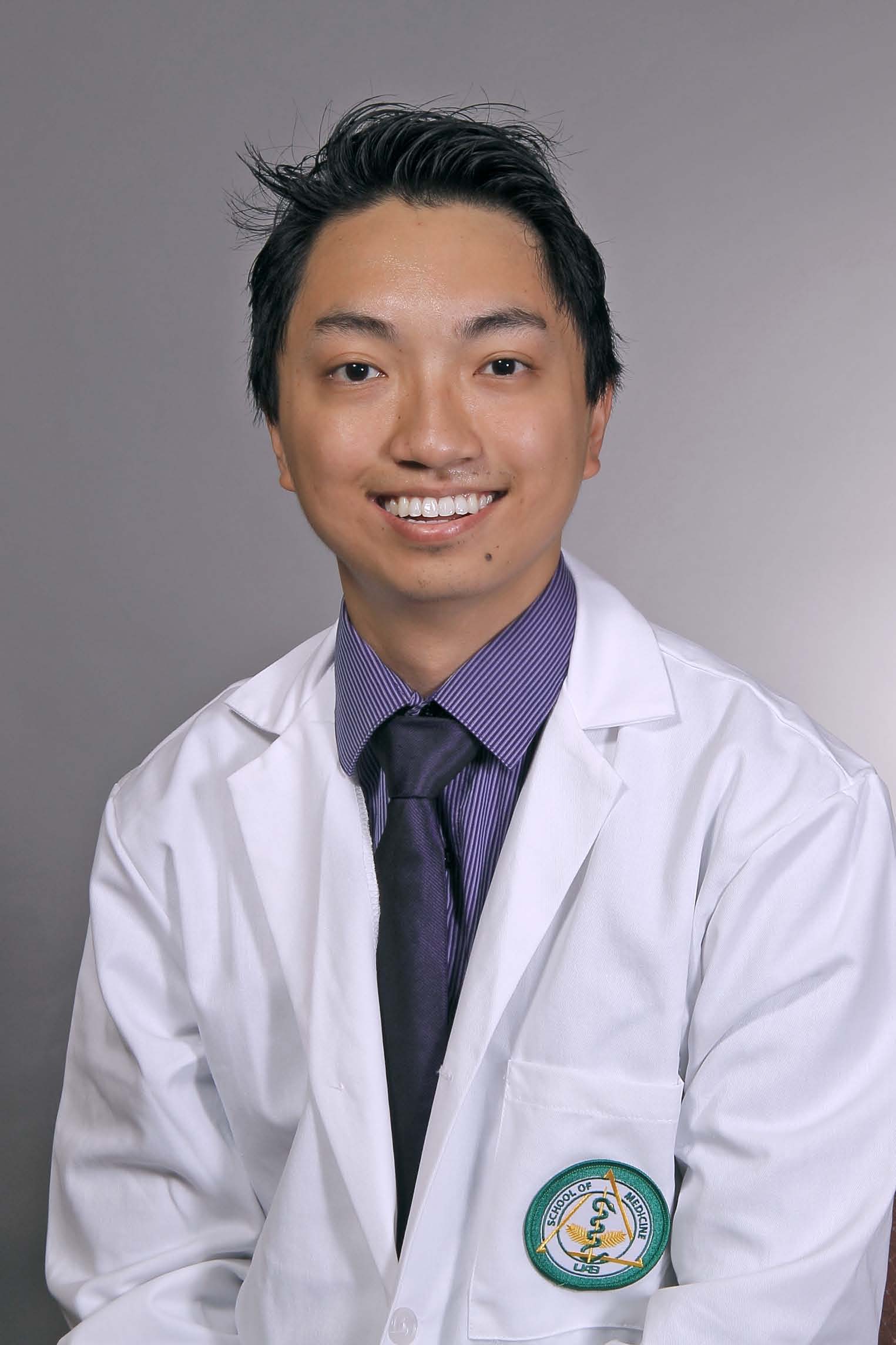
What are your clinical and research interests?
Robotics and reconstruction.
How did you choose to practice this area of urology?
In terms of robotics, by the end of residency I felt the most comfortable and confident on the console of the robot compared to open procedures; I really am fascinated by how technology has changed urology and look forward to participating in its advancement of the field. Reconstruction was the area of urology that most interested me during residency.
What aspect of your time at UAB do you believe was most valuable as you started your career?
The number and diversity of the cases that I participated in definitely gives me confidence in terms of starting out. UAB urology has all the sub-specialties covered, which, in addition to a large volume of trauma and emergent cases while on call, I feel has prepared me well for what lies ahead.
Did you have a particular mentor while at UAB? If so, why were they a good mentor?
Research wise I worked with Dr. Rais Bahrami and Dr. Assimos. They both have tremendous enthusiasm for research and numerous novel ideas; their guidance allowed projects to easily turn into publications in reputable journals.
Surgically I really admired Dr. Sudarshan and Dr. Nix. They were both excellent surgeons and technically proficient. Both gave an appropriate balance of independence and instruction in the OR, which ultimately is what allowed me to develop confidence in my surgical skills.
What is one of your fondest memories from UAB?
The graduation ceremony was a great way to end residency. It gave me an opportunity to thank my family, the faculty and co-residents for everything they’ve done to get me to this point. Other than that, the daily interactions with my co-residents and the inside jokes and bonds we developed over the years will stick with me the most.
Give one piece of advice for current residents.
When you do well, praise each other; when you fail, support each other; in time you’ll come to respect and love each other.
What do you like to do in your free time?
Currently, lounging by the highest pool in the state of Texas, reuniting with old friends and playing with my dog. Also I started painting portraits of clowns.
- Wood Receives NIH K08 Grant
- My Experience: Urology in Europe
- UAB Urology Match 2018
- Six UAB Urology Physicians Named to Best Doctors in America® List
- Kidney Stone Research Lab Update
- Alumni Spotlight: Dr. Courtney Shepard
- A Movember Celebration
- UAB Urology: A Leader in Kidney Stone Research
- Overview: Gulf Coast Urology Seminar 2017
- 2017 American Urological Association Annual Meeting
- Joseph Receives Reginald C. Bruskewitz Distinguished Alumni Award
- UAB Urology ranked #20 in U.S. News Best Hospitals
- Hundreds of UAB physicians named to prestigious 2015-16 Best Doctors in America list
- Dangle establishes a pediatric robotic urologic surgery program at Children's
- Alumni Spotlight: Ben Martin, M.D.
- Successful Interview Season Complete
- UAB Surgical Team Proud of Outcomes From ERAS Pathway
- Resident shares research experience
- Mitchell receives K01 Award from NIH
- UAB and Baptist Health partner to open new clinic in Montgomery
- 2015-2016 Update and Doximity Voting
- Welcome New Faculty: Drs. Dangle and Wood
- Kidney Stone Group Clinic Now Accepting Referrals
- SESAUA Update 2016
- Outgoing and Incoming Residents 2016
- Nix Named Director of Robotic Surgery
- Dr. Killian shares her training experience in Zambia
- Assimos gives two talks at AUA